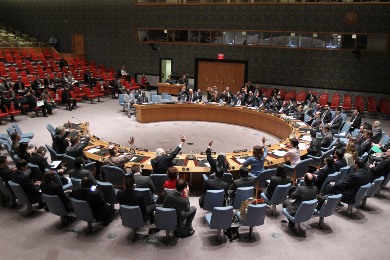UN Security Council renews sanctions on war-torn S. Sudan
May 9, 2018 (NEW YORK) – A resolution allowing for the renewal of sanctions against South Sudan for another year has been adopted unanimously by the UN Security Council on Tuesday.

The 15-member Council also decided to extend the mandate of the Panel of Experts overseeing the sanctions for another 13 months.
The chair of the Security Council Committee on South Sudan, Joanna Wronecka said the crisis in South Sudan was alarming with political leaders from both sides showing no interest to defuse the situation.
Wronecka, referring to the Panel of Experts report, urged the international community to apply more pressure to avoid the South Sudan situation from further deteriorating.
The experts’ committee was established in 2015 to administer the implementation of the sanctions related to South Sudan.
The Security Council in 2015 imposed sanctions on some six South Sudan military leaders on the ground of fuelling the conflict and orchestrating war crimes and crimes against humanity since the start of the war.
“Given that this recommendation was addressed to the Council, the Committee took note of, but no action on it,” said Wronecka.
In 2015, the Security Council imposed sanctions on some six South Sudan military leaders on the ground of fuelling the conflict and orchestrating war crimes and crimes against humanity since the start of the war.
Those sanctioned were the former commander of the Tiger Division, Gen Marial Chanuong, Gen Santino Wol and Gen Jok Riak, from the government side. The opposition group comprised Gen Peter Gatdet, Gen James Koang Chuol and Gen Gatwech Dual.
REGIONAL EFFORTS
On Tuesday, however, the sanctions committee also agreed to send letters to the members of the regional bloc (IGAD), reiterating the importance of these states’ obligation to enforce the asset freeze to specifically request bank accounts and assets of designated individuals Chanuong and Riak to be frozen.
Meanwhile, South Sudan’s ambassador to the UN, Akuei Bona Malwal said the report by the Panel of Experts was openly tilted against the young nation’s government.
“While the Panel had visited Juba, it had mainly cited information from interviews conducted with members of the opposition in Nairobi and Kampala. Senior government officials were mentioned repeatedly as hardliners in order to paint the government as an obstacle to peace,” said the South Sudanese diplomat.
He added, “One could only deduce that the purpose was to lay the grounds for the justification of international sanctions”.
The conflict in South Sudan, now in its fifth year, started after a disagreement within the country’s ruling Sudan People’s Liberation Movement (SPLM) before civil war broke out in December 2013. Since then, tens of thousands of people have died as a result of the war and nearly 4.3 million have reportedly been driven from their homes.
(ST)
